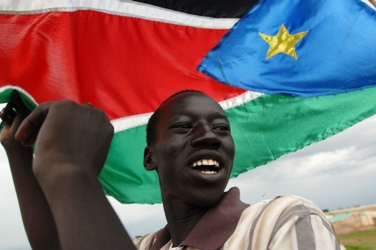Ngok Dinka to hold Abyei referendum this month
October 19, 2013 (JUBA/KHARTOUM) – The Ngok Dinka have openly declared their intention to conduct the Abyei area community referendum, saying they see “no light at the end of the tunnel”.

The move, which was inadvisable by African and international bodies, would put the area at high risk of communal violence between the Ngok Dinka and Misseriya who claim also the ownership of the region.
The referendum, the community said in a statement emailed to Sudan Tribune by the former Co-Chair of the Abyei Joint Oversight Committee Luka Biong, should be conducted in a fair and transparent manner, while calling upon the international community, media houses and relevant organisations to monitor and observe the process.
No specific date was, however, fixed for the self-determination vote. However since Saturday reports emerged saying that the vote would be conducted during the last days of the month and the result would be announced on 31 October.
The community leaders prepared this vote since several months and they encouraged the return of its members to the disputed areas. UN aid agencies estimate that over 10.000 people recently regained Abyei.
North and South Sudan fought over two decades of civil war, which only ended with the 2005 signing of the Comprehensive Peace Agreement in Kenya.
Under its protocol on Abyei, however, the people of the contested region should have conducted their referendum at the same time as the South Sudanese, but was postponed due to disagreements between the North and South Sudanese leaders.
These differences mainly centred on the eligibility of voters. While Juba maintained that only the nine Ngok Dinka chiefdoms were eligible to vote as permanent residents of the area, Khartoum insisted that the Misseriya Arabs, who are temporary residents, be allowed to take part in the referendum.
So, although the protocol specifies Abyei residents as eligible voters, it still remains unclear as who were the legal inhabitants of the contested area, which is claimed by both countries.
In 2009, however, the Permanent Court of Arbitration (PCA) redefined Abyei area as the land of the nine Ngok Dinka chiefdoms.
The community, in one of its resolutions, recognised efforts of African Union Peace and Security Council (AUPSC) to put the two Sudans on the track of peace and stability by adopting a comprehensive roadmap in April, 2012 that was endorsed by the United Nations Security Council in form of its resolution 2046 in May, 2012.
“(We…) Believe that the United Nations represents a vision for humanity where national and sovereign interests align with a higher respect for the fundamental rights of peoples,” the communiqué reads in part.
Last year, the AU mediation team proposed holding a referendum in Abyei this month, but stated that only those residing permanently in the area will be allowed to vote in the plebiscite and decide whether they want to join Sudan or South Sudan.
The Sudanese government, however, rejected a AU proposal aimed at breaking the deadlock over Abyei referendum saying it ignored that the eligibility of the Misseriya.
A leading member of the ruling National Congress Party (NCP) in Abyei accused the Ngok Dinka of defying the AU decision and preparing to hold an unilateral vote on the fate of the disputed region.
Mac Yak Kor, a former member of Abyei administration accused Deng Alor, a leading member in the South Sudan ruling party SPLM and former minister, of mobilising the Ngok Dinka to carry out a referendum to determine the future of the contested area.
Kor told the official news agency (SUNA) that Alor uses a group called “Youth for Abyei Referendum” to prepare for the unilateral vote, stressing they are now campaigning in the northern part of the claimed area.
He called on the United Nations mission in Abyei (UNISFA) to “take the necessary steps to stop these negative moves” which aim to portray Sudan as the biggest enemy of the Dinka, Kor added.
During last week’s meeting with the UN special envoy for two Sudans, president Salva Kiir expressed his disappointments at the way the international community responded to calls for immediate intervention on Abyei.
“There is also a need for an honest approach from the international community so that the conflict is resolved amicably at once”, the South Sudanese leader told Haile Menkerios.
BASHIR AND KIIR SUMMIT
Sudanese president Omer Al Bashir plans to travel to Juba on Tuesday 22 October at the invitation of his South Sudanese counterpart Salva Kiir.
The foreign minister Ali Karti said on Sunday that the two leaders , among other things, will discuss the issue of Abyei and the decisions of the African Union on Abyei, in addition to the decisions agreed by the two sides on the disputed area.
The Sudanese official is referring to the formation of Abyei interim institutions agreed on 20 June 2011. But the Nogk Dinka refuse the implementation of this deal saying they are no longer ready to share the administration of their region with Misseriya.
Karti, however, was keen to minimise the impact of Abyei issue on bilateral relations saying that the two presidents are capable of banishing any fears that may trouble the evolving relations between the two countries.
A delegation from the African Union Peace and Security Council is expected to visit Abyei on Tuesday to inspect the situation there, Sudan Tribune, has learnt.
The visiting delegation would meet the leaders of Ngok Dinka and meet with the UN mission in Abyei.
(ST)
